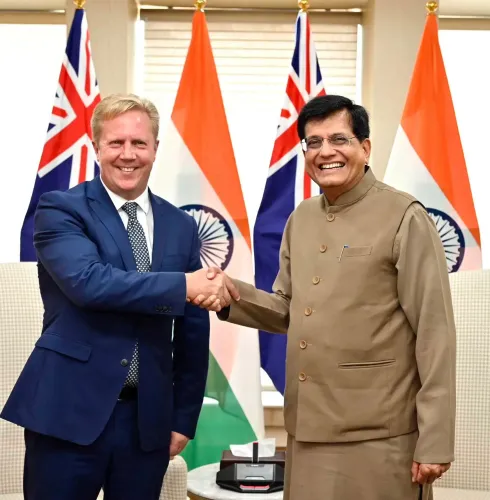Is the India-UK Trade Deal a Major Victory for Brand Modi?

Synopsis
Key Takeaways
- The India-UK trade deal enhances Brand Modi's global presence.
- Indian farmers gain zero-tariff access for key agricultural products.
- Job creation is anticipated in both countries.
- Indian tech professionals benefit from exemptions on social security contributions.
- The gem and jewellery sector is set for a turnaround.
New Delhi, July 24 (NationPress) The recent trade agreement between India and the UK, officiated by Prime Minister Narendra Modi alongside UK Prime Minister Keir Starmer, marks a significant enhancement for Brand Modi on the international platform, as per finance experts on Thursday.
In an interview with IANS, Ajay Rotti, a prominent financial analyst, remarked that the successful finalization of this intricate deal, especially during a time when global trade discussions are encountering challenges, showcases Prime Minister Modi's leadership and India's ascending role in the global economic and geopolitical landscape.
Rotti referred to the agreement as a historic achievement, not only for diplomatic relations but also for its tangible advantages for India's farmers, exporters, and professionals.
"The Comprehensive Economic and Trade Agreement (CETA) provides Indian agricultural products—such as millets, jackfruit, and processed seafood—with zero-tariff entry into the UK market," Rotti stated.
"This initiative is poised to enhance the earnings of Indian farmers, while sensitive areas like dairy have been excluded from the agreement to safeguard small and marginal farmers domestically," he further noted.
He also mentioned that India’s gem and jewellery industry, which has faced challenges in recovering momentum, is likely to see positive impacts.
"With eased regulations for exports of finished and gold jewellery, the sector is anticipated to witness a surge in overseas demand, particularly from the UK," Rotti emphasized.
Moreover, Rotti highlighted that this agreement constitutes India’s largest trade deal to date and the UK’s most significant one post-Brexit.
"For Indian technology professionals, one of the most important benefits is the exemption from social security payments while working temporarily in the UK," he pointed out.
"This eliminates the issue of double deductions, making Indian talent more competitive. Additionally, expedited visa processing will facilitate Indian techies in pursuing career prospects in the UK."
The agreement also significantly supports India’s chemical industry. With zero-tariff access to the UK and enhanced mobility for skilled workers, Indian chemical companies will be well-positioned to engage in global value chains.
According to Rotti, this agreement is expected to generate job opportunities in both nations. As Indian firms broaden their footprint in the UK and British enterprises increase investments in India, thousands of new jobs will emerge.
"This job creation will also be indirect, as heightened exports and production will stimulate more employment at the grassroots level in India," he concluded.









